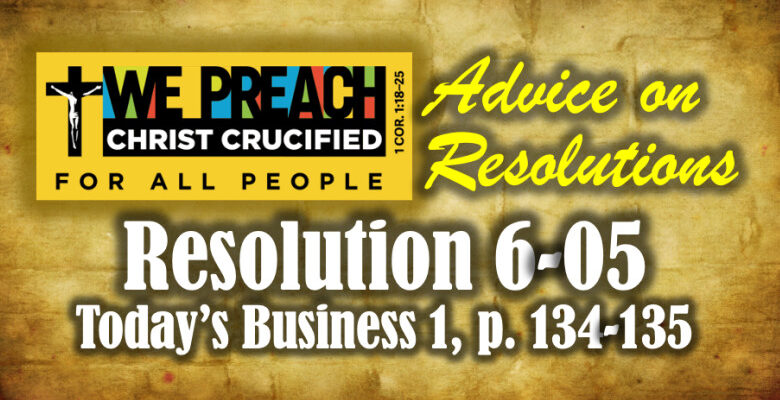What should concern delegates?
Instead of “Affirming and Clarifying” Bylaw 3.10.2.4, this resolution changes the bylaw.
The first “Whereas” (lines 35-37) is incorrect. Currently, LCMS laymen and commissioned ministers who have completed an M.Div. from seminaries outside of the LCMS may participate in the colloquy process.
Changing Bylaw 3.10.2.4 in this way will remove the possibility of colloquy for these otherwise qualified LCMS members.
The Bylaw as it currently stands only describes how to participate in the Residential Alternate Route program. It does not even mention the Colloquy Program.
It seems the desire of the Floor Committee is to create more obstacles for those desiring to serve in the pastoral office of the LCMS.
The change would give “laymen of a special ethnic or linguistic group, and laymen who have fulfilled at least ten years of significant service in a congregation” (Bylaw 3.10.2.3) the ability to be trained to serve as a pastor in the LCMS, but not an LCMS layman who has graduated from a non-LCMS seminary and is looking for additional training and colloquy into the LCMS pastoral ministry.
What can be done about it?
This resolution does not remove extraneous wording. It restricts and changes the meaning of the bylaw. Ask how it is appropriate and constitutional order to change a bylaw that describes the Residential Alternate Route program into a bylaw that restricts the colloquy program, removing the possibility of the Residential Alternate Route program for otherwise qualified candidates.
Ask what has changed in the LCMS that we can’t trust the Colloquy Committee to do its work. Isn’t it their job to determine what qualifies as appropriate education and background to be received into the LCMS ministry by the colloquy process? What errors have they made in allowing someone into the Colloquy program who should not serve in the LCMS?
Ask what problem facing the LCMS this is addressing. Which men have applied for colloquy who have “snuck in” to the LCMS clergy by obtaining an M.Div. from a non-LCMS institution? How many people does this affect? This seems to be targeting LCMS laymen who, for whatever reason, attend another seminary and receive an M.Div. degree.
Ask if this is really an issue of changing the bylaws to close the opportunity for men entering the ministry from so-called district preparation programs or houses of study nationally or internationally.
Ask why receiving any degree from a non-LCMS seminary should disqualify a man from the possibility of service in the LCMS.
This resolution should therefore be defeated.

